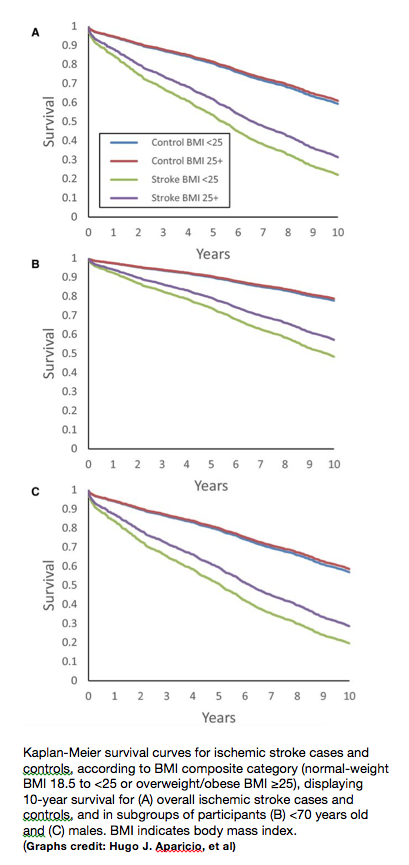One phenomenon that continues to mystify physicians and healthcare professionals alike is the "obesity paradox," the idea that significant extra weight can actually be beneficial and provide protection in some circumstances.
For years, studies have been released that produced competing findings – some that supported its existence, others that undermined it – only serving to muddy the waters in this area of research.
While just recently in April the medical community learned of news that undercut the paradox, this week the release of a new study again produced contradictory results, that those "overweight or even mildly obese survive strokes at a higher rate as compared to those with a normal body weight."
 That's from a statement issued yesterday from Boston University School of Medicine, announcing findings just published in the Journal of the American Heart Association. The paper, titled "Overweight, Obesity, and Survival After Stroke in the Framingham Heart Study," concluded that "overweight and mildly obese participants had better 10‐year survival after ischemic stroke compared with normal‐weight participants, even after excluding persons with recent prestroke weight loss."
That's from a statement issued yesterday from Boston University School of Medicine, announcing findings just published in the Journal of the American Heart Association. The paper, titled "Overweight, Obesity, and Survival After Stroke in the Framingham Heart Study," concluded that "overweight and mildly obese participants had better 10‐year survival after ischemic stroke compared with normal‐weight participants, even after excluding persons with recent prestroke weight loss."
And specifically, two subgroups benefited most, as "the survival benefit was strongest in males or in those younger than age 70," according to Dr. Hugo J. Aparicio, an assistant professor of neurology at BU and lead author of the study.
Many thousands of individuals dating back to 1948 were originally enrolled in the Framingham study (FHS) and as stated in the study, between "January 1951 and December 2011, 1058 subjects between the ages of 45 and 85 had an incident stroke," with 276 cases excluded for a number of different reasons. Prior to having a stroke, each had their body mass index (BMI) measured.
These cases were then matched to "other FHS participants of similar age, sex and BMI category (normal weight, overweight or obese). They then separately analyzed both groups to see if overweight or obesity had any effect on survival over 10 years, compared to the people who were normal weight." The study also controlled for cancer, dementia, smoking, diabetes, high cholesterol and high blood pressure.
Of course, these finding do not suggest that obesity is a preferred state of health, and they also don't mean that all subgroups of overweight and obese people would derive similar benefit.
"Nonetheless, observing this so-called 'obesity paradox' has important clinical implications," added Dr. Aparicio, "and it is essential for clinicians and researchers to better understand the role of body weight in recovery after stroke."




